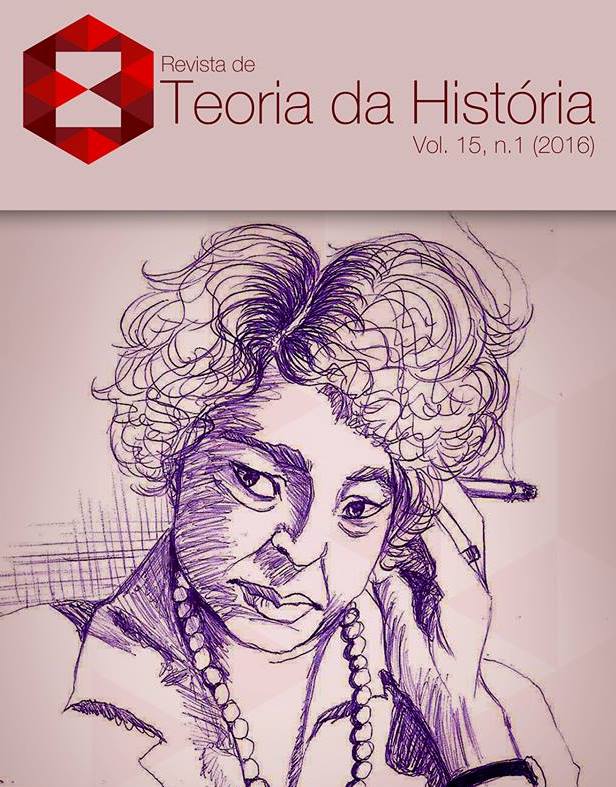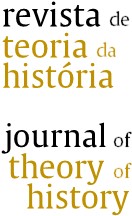INTERRUPÇÃO E HISTÓRIA: WALTER BENJAMIN E BERTOLT BRECHT
Palavras-chave:
Walter Benjamin, Bertolt Brecht, interrupção, teatro épico, tempo históricoResumo
O presente artigo trata das afinidades intelectuais estabelecidas entre Walter Benjamin e Bertolt Brecht. A partir da leitura teórica do que este convencionou chamar de teatro épico, apontaremos ressonâncias desta teoria no pensamento benjaminiano quanto ao tempo histórico, apontando principalmente o conceito de interrupção como denominador comum daquelas afinidades.
Referências
BENJAMIN, Walter. Gesammelte Schriften. Unter Mitwirkungvon Theodor W. Adorno undGershom Scholem, Herausgegeben von Rolf Tiedemann und Hermann Schweppenhäser. Frankfurtam Main: Suhrkamp Verlag, 1974. 7 v.
________. Briefe. Herausgegeben um mit Amerkungen verstehen Von Gershom Scholemund Theodor Adrono. Frankfurt am Main: Suhrkamp Verlag, 1978. 2 v.
________. Origem do Drama Barroco Alemão. Sérgio Paulo Rouanet (tradução, apresentação e notas). SãoPaulo: Brasiliense, 1984.
________. Teses sobre o conceito de história In LÖWY, Michael. Aviso de incêndio: uma leitura das teses "Sobre o conceito de história". Trad.: Wanda Nogueira Caldeira Brant, com tradução das teses por Jeanne Marie Gagnebin. São Paulo: Boitempo, 2005.
________. Passagens. Irene Aron(trad. Do alemão); Cleonice Paes Barreto Mourão (trad.do francês); Belo Horizonte: Editora UFMG; São Paulo: Imprensa Oficial do Estado de São Pau-lo, 2007.
________. Ensaios reunidos: escritos sobre Goethe. Mônica Krausz Bornebusch, Irene Arone Sidney Camargo (trads.); Marcus Vinicius Mazzari (supervisão e notas). São Paulo: Duas Ci-dades; Ed. 34, 2009.
BRECHT, Bertolt. Ausgewählte Werke. Frankfurt am Main: Suhrkamp Verlag, 1997. 6 v.
________. Gesammelte Werke. Herausgegeben von Suhrkamp Verlag in Zusammenarbeit mit Elisabeth Hauptmann. Frankfurt am Main: Suhrkamp Verlag, 1976. 20 v.
________. Diário de trabalho. Trad.: Reinaldo Guaranye José Laurenio de Melo. Rio de Janei-ro: Rocco, 2002. 2 v.
________. Brecht on theatre: the development of anaesthetic. Trans. and sel.: John Willet. London: Eyre Methuen, 1964.
BUCK-MORSS, Susan. The dialectics of seeing: Walter Benjamin and the Arcades project. Cambridge, Mass.: The MIT Press, 1989.
________. The origin of negative dialectic. NewYork: The Free Press, 1977.
CASTRO, Cláudia. A alquimia da crítica: Benjamin e As afinidade seletivas de Goethe. Rio de Janeiro: Paz e Terra, 2011.
DORT, Bernard. O Teatro e sua Realidade. São Paulo: Perspectiva, 1977.
GAGNEBIN, Jeanne Marie. História e memória em Walter Benjamin. São Paulo: Perspectiva, 2007.
________. A propósito do conceito de crítica em Walter Benjamin. In Discurso. Nº 13, Ano19, 1980.
________. Walter Benjamin: os cacos da história. São Paulo: Brasiliense, 1982.
HABERMAS, Jürgen. Conciousness-Raising or Redemptive Criticism – The Contemporaneity of Walter Benjamin In New German Critique . Nº 17, 1979.
JAMESON, Fredric. Brecht e a questão do método. Trad. Maria Sílvia Betti. São Paulo, Cosac Naify, 2013.
MATOS, Olgária. Walter Benjamin: a citação como esperança In Revista Semear. Nº 6 Disponível em: http://www.letras.puc-rio.br/unidades&nucleos/catedra/revista/6Sem_20.html. Acesso em: 09 de setembro, 2013.
PRIMAVESI, Patrick. Übersetzung, Kommentar: Theaterin Walter Benjamins frühen Schrif-ten. Frankfurt und Basel: Strömfeld Verlag, 1998.
ROSENFELD, Anatol. O teatro épico. São Paulo: Perspectiva, 2010.
WIZISLA, Erdmut. Walter Benjamin and Bertolt Brecht: The history of a friendship. Trad.: Christine Shuttlewort. New Havenand London: Yale University Press, 2009.
Downloads
Publicado
Como Citar
Edição
Seção
Licença
A Revista publica única e exclusivamente artigos inéditos. São reservados à Revista todos os direitos de veiculação e publicação dos artigos presentes no periódico.
Licensed under a Creative Commons Attribution-NonCommercial-NoDerivatives 4.0 International License



